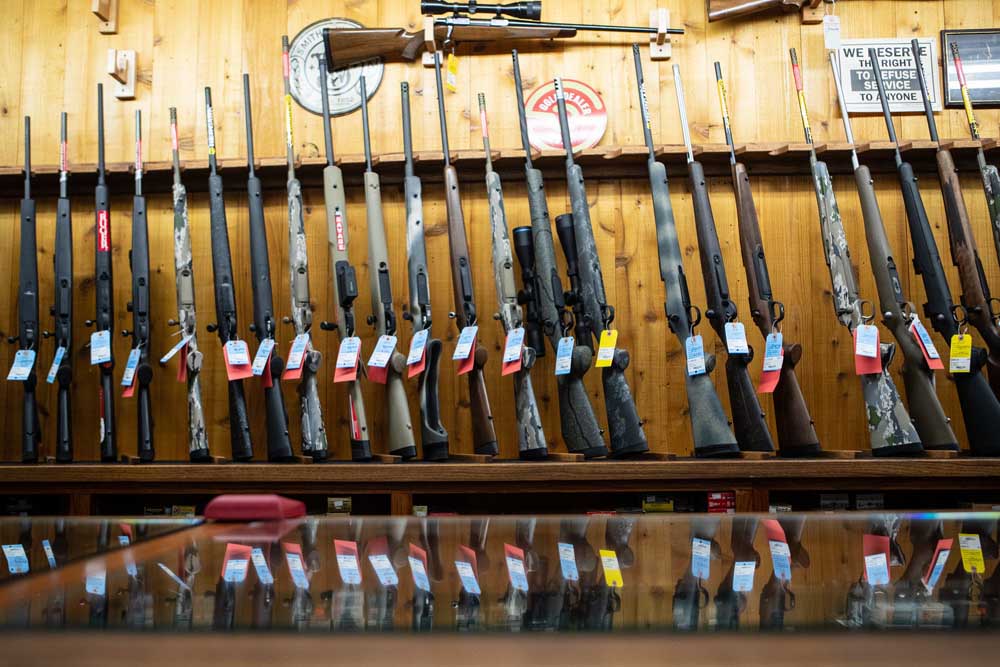Oregon lawmakers consider gun control bills amid legal battle over Measure 114
Published 7:18 am Monday, April 21, 2025

- Guns for sale are displayed at Hammer Down Firearms in Bend on Feb. 8.
As legal challenges to a voter-approved gun control law continue, Oregon lawmakers are considering a set of additional restrictions on gun purchases that are among the most controversial measures of the legislative session.
The three bills, each of which advanced from committees on party-line votes, would increase maximum fees to apply for gun permits, codify Measure 114’s ban on magazines with 10 or more rounds, mandate dealers be licensed by the Oregon Department of Justice, install a 72-hour waiting period to avoid impulsive purchases and ban devices that allow faster firing of guns.
Advocates and legislative Democrats who back the bills say they’re crucial for public safety as gun deaths continue to rise. The overall gun death rate in Oregon increased 31% from 2013 to 2022 and firearms were the fifth leading cause of death among children and teens ages 1-17, according to federal data compiled by Johns Hopkins University.
Oregon’s firearm death rate is near the national average and higher than California and Washington, according to the Centers for Disease Control and Prevention.
But Republicans including Rep. Rick Lewis, R-Silverton, argue the Legislature has already done too much to regulate guns. In recent years, Oregon has passed laws banning untraceable 3-D printed guns, requiring secure storage of guns and allowing courts to temporarily remove firearms from people at risk of harming themselves or others.
“Every session since I’ve been here we’ve had at least one gun bill and it never seems to be enough for this body,” Lewis said before voting against one bill. “I’ve received probably well over a thousand emails from people in opposition to this.”
Voters narrowly passed Measure 114 in 2022 to ban magazines with 10 or more rounds and end a loophole that allows firearm dealers to sell guns without a background check if it’s not completed within three business days.
It also mandated that anyone who buys a gun in Oregon obtain firearms safety training and a permit to purchase a firearm. Less than a month after it passed, Harney County Judge Robert Raschio blocked the measure on the basis that it infringed on the Oregon constitution’s Article 1, Section 27, which says “people shall have the right to bear arms for the (defense) of themselves.”
The Oregon Court of Appeals overturned Raschio’s decision last month, but the law remains on hold after gun owners appealed to the Oregon Supreme Court last week.
Codifying Measure 114
House Bill 3075, sponsored by Rep. Jason Kropf, D-Bend, would codify Measure 114’s ban on magazines with 10 or more rounds, provide a 180-day grace period for owners to dispose of their high-capacity magazines and increase maximum permit fees from $65 to $150 and maximum renewal fees from $50 to $110. It would also increase the maximum time authorities have to make a decision from 30 to 60 days from the date of the permit request.
The bill, like Measure 114, would also close the “Charleston loophole,” named after a 2015 shooting at a Black church in Charleston, South Carolina. The shooter, a self-admitted white supremacist, was ineligible to purchase a gun because of a drug charge but was allowed to buy one anyway because authorities took more than three business days to conduct a background check. If the bill is adopted or Measure 114 takes effect, background checks would have to be completed before authorities grant any permits.
A completed background check is necessary to make sure only people who are safe with firearms can possess them, Kropf said ahead of an April 8 committee vote on the bill.
“A lot of the work that we are doing on these bills mirror what I learned as a kid: how to be safe with a firearm and how to make sure that safe people have firearms,” he said.
Under House Bill 3075, gun owners must have also completed gun safety courses in the 5 years previous to applying for a permit. Opponents including the Oregon Hunters Association argue that would burden longtime gun owners.
“Many of our members obtained these licenses many years ago, completed hunter education (including firearm safety), and have responsibly used firearms throughout their lives,” Oregon Hunters Association representative Paul Donheffner said in written testimony.
The House Judiciary Committee advanced the bill on a 5-3 vote along party lines. Because legislative fiscal analysts estimate it would cost about $14.6 million to implement during the next two-year-budget cycle, the budget-writing Joint Ways and Means Committee has to approve it before the House can vote on it.
State-level licensing
House Bill 3076, also sponsored by Kropf and other Democrats, would establish a state-level licensing system for gun dealers. They currently have to be licensed by the Bureau of Alcohol, Tobacco, Firearms and Explosives, a process that involves fingerprinting, background checks and an interview, according to the ATF website. If the bill passes, Oregon would join 16 other states that require dealers to obtain an additional state-level license to sell firearms.
“When gun dealers follow best practices, they are one of our first lines of defense against gun trafficking, gun homicides and failed domestic violence,” Kropf said. “This (bill) allows us to set those best practices and standards for safety and security with our licensed firearms dealers.”
A 2024 study from the Alliance for a Safe Oregon found that most guns used for crimes in Oregon came from legal gun dealers, and the average gun dealer in the state is inspected by ATF only once every ten years.
“The gun industry will tell you that (dealers) are heavily regulated … that’s wildly untrue,” alliance executive director Jess Marks said. House Republicans oppose House Bills 3075 and 3076.
“These bills force additional, expensive regulations on law-abiding citizens that many of them cannot afford,” said Rep. Greg Smith, R-Heppner. “Writing a blank check to the Department of Justice to enforce what’s already codified in federal law is bad policy.”
The House Judiciary Committee advanced the bill on a 5-3 vote along party lines on April 8. The Joint Committee on Ways and Means must approve it before the full House can vote because establishing the licensing program would cost an estimated $5.8 million.
Waiting period
Senate Bill 243 would introduce a mandatory 72-hour minimum waiting period from when a permit is requested to when it can be granted. It is meant to discourage impulsive purchases, which have been linked to higher rates of gun suicides and several mass shooting incidents including the 2022 shooting in Uvalde, Texas. Currently 10 states, including California and Washington, have waiting periods of up to 10 days before gun purchases.
The bill would also ban rapid fire activators, devices that turn semi-automatic rifles into fully automatic rifles, making them deadlier, such as the one used by the shooter of the 2017 Las Vegas, Nevada massacre, which claimed the lives of 60 people and injured more than 400.
Early versions of the bill also raised the minimum age to own a firearm from 18 to 21 but that provision has been eliminated.
The bill would prevent many deaths because of how lethal firearms are, Marks said. Oregon has a high firearm suicide rate compared to other states, “and a significant portion of those deaths are impulsive,” she said.
Marks supports finding a balance between Second Amendment rights and regulations meant to protect potential victims of gun violence.
“We should respect Oregon firearm owners while putting first the safety of our kids and communities,” she said.
Most gun rights groups in Oregon oppose the bill. The 72-hour waiting period constitutes an “unnecessary delay for law-abiding citizens who wish to exercise their right to bear arms” and could “create logistical challenges for gun dealers and buyers, leading to potential economic impacts on small businesses,” according to Rick Coufal, a firearms instructor and member of the National Rifle Association’s Institute for Legislative Action who submitted written testimony against the bill.
The Senate Judiciary Committee passed the bill on a 4-2 vote along party lines on Wednesday, April 9, and the bill is awaiting a Senate vote.
Gun control legislation in Oregon and other states comes as President Donald Trump’s administration begins to roll back Biden-era gun control measures, including a policy that removes federal licenses of firearms dealers found to have repeatedly violated federal regulations.
Republican lawmakers have also introduced legislation to make obtaining firearms easier, including a joint resolution to enshrine the right to carry concealed firearms into the Oregon constitution. A group of bipartisan legislators has also introduced a bill to allow them and their staff to carry concealed firearms in the Capitol building.
This article was originally published by Oregon Capital Chronicle and used with permission. Oregon Capital Chronicle is part of States Newsroom and can be reached at info@oregoncapitalchronicle.com.






